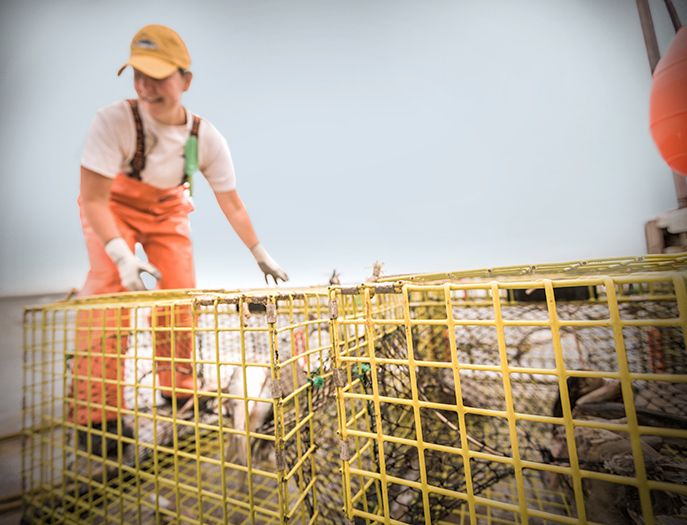
Fishing has been the economic and cultural pillar for many coastal towns along the Northeast coast for generations. But a warmer climate threatens the abundance and distribution of key species like haddock and Atlantic cod. And that will spell trouble for these fishing towns, according to new research.
The study looked at 33 marine species. Overall, seven species will generally suffer from climate change while only two, longfin inshore squid and butterfish, will have improved habitat throughout the region, the scientists found. Atlantic cod is poised to be the biggest victim. Even in the coldest areas, temperatures would exceed the thermal optimum for cod by 2050.
All of this will result in declining fishing opportunities for a majority of local communities unless they adapt. Communities of small trawlers in Maine are most exposed because of their historical dependence on species expected to lose habitat suitability in the future — for instance, Atlantic cod and witch flounder.
The adaptation will require totally new approaches to fishing. Possible solutions are catching new species or fishing in new locations. Shifting species portfolios could be an effective way to adapt to a changing ocean environment. And this is already happening in some places, including squid fisheries in the Gulf of Maine that developed during the hot summer of 2012. But there’s a catch: while diversification can buffer fishers against climate change, market forces can also incentivize specialization.
I’ve asked quantitative ecologist Lauren A. Rogers, who co-authored the study, and Monique Coombs, director of marine programs at the Maine Coast Fishermen’s Association, to share their views on this problem. Here are their answers:
Lauren A. Rogers, quantitative ecologist:
Climate change is already presenting challenges for fishing communities and bringing new opportunities in some places. There are well-documented cases of fishers needing to travel farther from port to fill their nets. We’ve also seen examples of new fisheries developing as species move into a region.
In our study, we found that exposure to climate risk varies across fishing communities based on past fishing practices. Most communities will need to adapt, either by shifting their fishing grounds or targeting new species or else face declining opportunities in the next generation. However, there are often barriers to adaptation, such as restrictions on where fish can be landed or the high cost of fishing permits and new fishing gear. Our study can help identify where adaptation strategies will be most needed and where to focus on removing barriers to adaptation when possible.
Monique Coombs, Maine Coast Fishermen’s Association:
— Fishermen are on the frontlines of climate change. Clam harvesters see the shells of the intertidal species softening because of ocean acidification. Changing weather patterns inhibits fisher’s safety because they are no longer able to depend on weather forecasts. Fishermen find the weather patterns changing more regularly and faster. This inhibits their safety because they are no longer able to depend on weather forecasts. Sea-level rise is impacting many coastal communities, of course.
Until everyone understands that we’re all responsible for the changes in our environment, I’m not sure fishing communities will get any better. So cynical, right? But it’s true. That being said, fishermen are adapting by becoming more involved and outspoken about the changes they see to make others aware and defend their industry. They are diversifying and attempting to alleviate pressure on one fishery by fishing multiple fisheries over the year.
And everyone can help fishermen in their quest. Just switch to a diet with a variety of seafood because picking a single species damages both the fishing business and seafood stocks.
Photo credit: Monique Coombs.